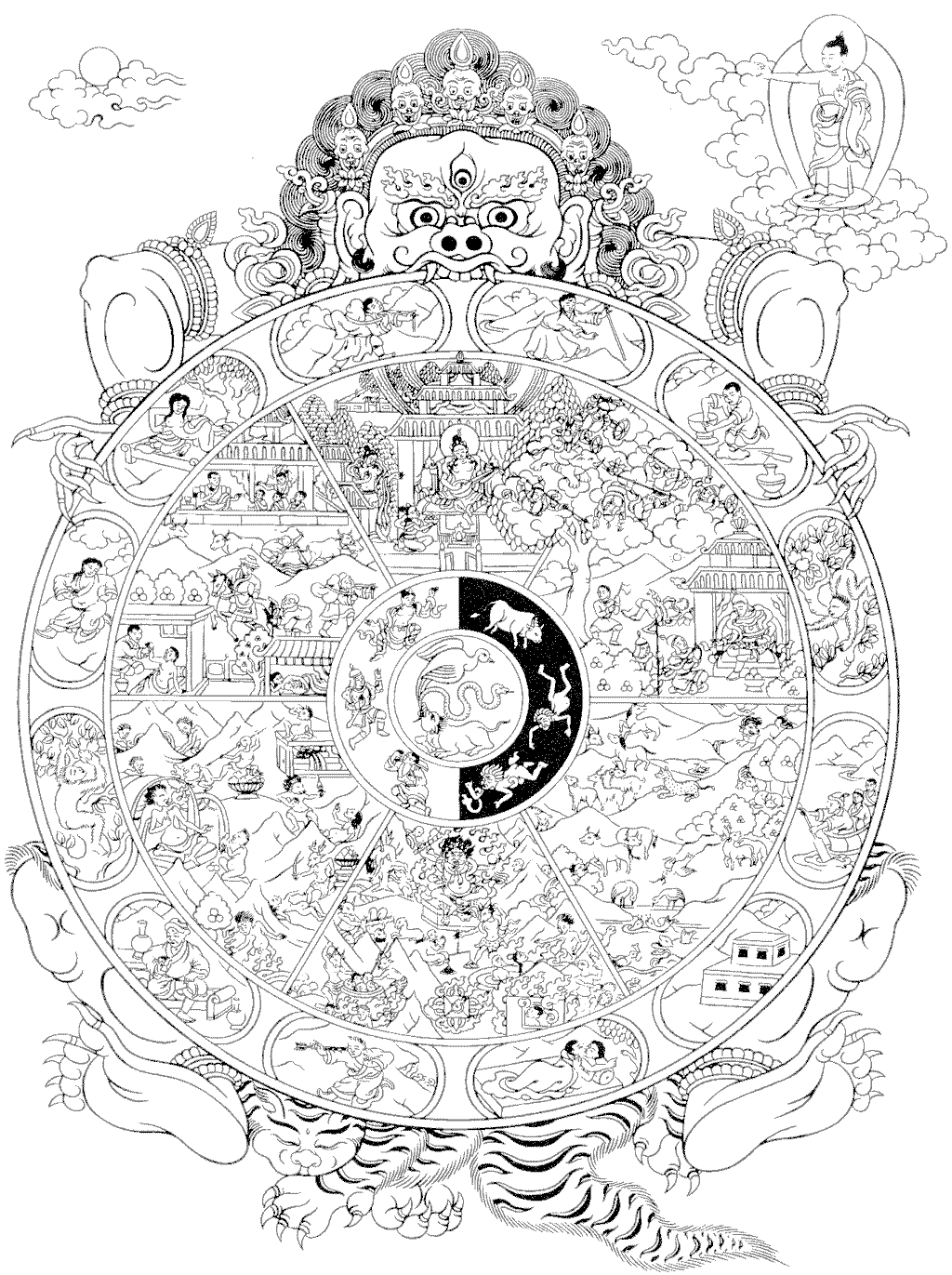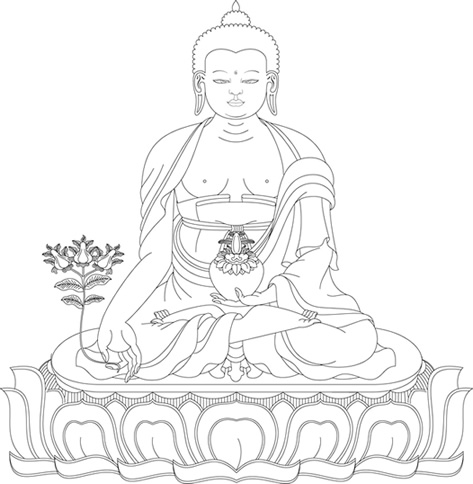 Buddhism is a very popular religion in the East and has recently been gaining attention here in the West. Much of the core teachings of Buddhism are contained within the Four Noble Truths, the Eight-fold path, and the Three Characteristics of Existence, as well as the other principles mentioned below.
Buddhism is a very popular religion in the East and has recently been gaining attention here in the West. Much of the core teachings of Buddhism are contained within the Four Noble Truths, the Eight-fold path, and the Three Characteristics of Existence, as well as the other principles mentioned below.
Four Noble Truths:
- Suffering exists (Life is suffering)
- Suffering arises from attachment to desires (Clinging: Suffering is due to attachment to desires)
- Suffering ceases when attachment to desire ceases (When attachment stops, suffering stops)
- Freedom from suffering is possible by practicing the Eight-fold Path (Stop attachment with the Eight-fold Path)
Read More (Offsite)
Eight-fold Path:
- Right View [ditthi]
- Right Intention [sankappa]
- Right Speech [vāca]
- Right Action [kammanta]
- Right Livelihood [ājīva]
- Right Effort [vāyāma]
- Right Mindfulness [sati]
- Right Concentration [samādhi]
Read More (Below)
Three Characteristics (or Marks) of Existence:
- Transiency (all things are impermanent)
- Sorrow (all beings suffer from all situations due to unclear mind)
- Non-Self (the perception of a constant “self” is an illusion)
Read More (Offsite)
Five Hindrances:
- Sensuous lust (craving)
- Aversion and ill will (avoiding)
- Sloth and torpor (laziness)
- Restlessness and worry (agitation)
- Skeptical doubt (doubting)
Read More (Offsite)
Five Clinging-Aggregates:
- Form Aggregate [rūpa] – external and internal matter; Externally, rupa is the physical world. Internally, rupa includes the material body and the physical sense organs.
- Sensation Aggregate [vedanā] – sensing an object as either pleasant or unpleasant or neutral.
- Perception Aggregate [saññā] – registers whether an object is recognized or not.
- Mental Fabrications Aggregate [saṅkhāra] – all types of mental habits, thoughts, ideas, opinions, prejudices, compulsions, and decisions triggered by an object.
- Subjective Consciousness Aggregate [vijñāṇa] – cognizance, that which discerns; a series of rapidly changing interconnected discrete acts of cognizance; the base that supports all experience. This is the field or space in which the other aggregates operate or organize themselves, it is the simple reaction or response when the sense-organs come in contact with external objects.
Read More (Offsite)
Seven Factors of Enlightenment:
- Mindfulness [sati] – awareness of the body, feeling, mind, and mental objects (to be conscious of our psychological state)
- Investigation [dhamma vicaya] – analysis of the true nature of all things
- Energy [viriya] – a mental property and related with the 6th of the 8-fold path: Right Effort
- Joy or Rapture [pīti] – also a mental property and it permeates both the body and mind
- Relaxation or Tranquility [passaddhi] – calmness of feelings, perception, activities and of the mind
- Concentration [samādhi] – steadiness of the mind; a mind that is undisturbed from its focus
- Equanimity [upekkha] – to be able to face the ups and downs of life without attachment to their outcome (this is neutrality or psychological equilibrium and not hedonic indifference)
Read More (Offsite)
Buddhist Practice(s) and Resources:
There are thee main aspects of Buddhist Practice:
- Moral Discipline (Ethics)
- Mental Discipline (Concentration)
- Wisdom (Insight)
- Mindfulness of Breathing (Offsite)
- Walking Meditation (Offsite)
- The Four Foundations of Mindfulness (Offsite)
- An Introduction to Buddhism [PDF] (Offsite)
- Knowing Experience: Exploring Pleasant and Unpleasant [Audio] (Offsite)
Explanation of the Eight-fold Path:
- Right View
- Knowledge of pain: (understanding suffering)
- Knowledge of the cause of pain: (understanding its origin)
- Knowledge of the cessation of pain: (understanding its cessation)
- Knowledge of the way that leads to the cessation of pain: (understanding the way leading to its cessation)
- Right Intention
- Intention to renounce: (intention of renunciation)
- Intention to not hurt: (intention of good will)
- Intention to not injure: (intention of harmlessness)
- Right Speech
- Refraining from falsehood (no lying)
- Refraining from malicious speech (no slander)
- Refraining from harsh speech (no yelling)
- Refraining from frivolous speech (no idle chatter)
- Right Action
- Refraining from taking life (not killing)
- Refraining from taking what is not given (not stealing)
- Refraining from sexual misconduct sometimes also translated as ‘unchastity’ (not fornicating)
- Right Livelihood
- Abandoning a false livelihood (giving up wrong livelihood)
- Living by right livelihood (earning one’s living by a right form of livelihood)
- Right Effort
- Not producing bad or evil thoughts (the effort to restrain defilements)
- Exercising will (willpower)
- Puts forth effort (the effort to abandon defilements)
- Begins to make exertion
- Application and exertion of one’s mind (the effort to develop wholesome states)
- Developing and filling up of good thoughts (the effort to maintain wholesome states)
- Right Mindfulness
- Being Mindful of the body (mindful contemplation of the body)
- Being mindful of the feelings (mindful contemplation of feelings)
- Being mindful of Thoughts (mindful contemplation of the mind)
- Dispelling longing and dejection towards the world (mindful contemplation of phenomena)
- Right Concentration
- Free of passions & evil thoughts (the first Dhyana/Jhana)
- This allows us to attain and abide in the first trance of joy and pleasure
- First trance is accompanied by reasoning & investigation and arises from seclusion
- Ceasing of reasoning & investigation (the second Dhyana/Jhana)
- in a state of internal serenity and with the mind fixed on one point
- one attains and abides in the second trance of joy and pleasure
- Second trance arises from concentration and free from reasoning & investigation
- Equanimity & indifference towards joy (the third Dhyana/Jhana)
- One abides mindful and self-possession
- One attains and abides in the third trance
- Dispelling pleasure & pain (the fourth Dhyana/Jhana)
- Even before the disappearance of elation and depression
- One attains and abides in the fourth trance
- The Fourth trance is without pleasure & pain and with the purity of mindfulness and equanimity
- Free of passions & evil thoughts (the first Dhyana/Jhana)
Read More (Offsite)
